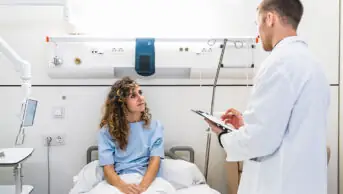
Shutterstock.com
Hospitals should look at the pharmacy support available to staff in emergency departments, a report from the Health Services Safety Investigations Body (HSSIB) has said.
The recommendation is from a report that was produced in response to the death of a patient with Parkinson’s disease, who was admitted to an unidentified hospital and spent three days in the emergency department (ED). In that time, he should have received 18 doses of a time-critical Parkinson’s medicine, the report states, but seven doses were not given and three doses were given late.
The patient deteriorated and later died, with identified causes of death including bronchopneumonia, Parkinson’s disease and the frailty of old age.
The report noted that the ED had no dedicated pharmacy support to help staff in providing care to patients who required time-critical medicines. It also said that in the ED, there were “no defined roles or responsibilities” to ensure patients who required time-critical medicines were identified and received a prescription as soon as possible.
In addition, the report says the ED previously had a dedicated ED pharmacist, and staff said that at that time they felt supported with medicines and prescribing. It added that “the funding for this post was temporary, and when the funding was no longer available, the post was made redundant”.
The report also found that the hospital’s electronic prescribing (ePMA) system “did not include a function to alert staff about patients who required time-critical medications to be prescribed or administered”.
As well as asking EDs to look at pharmacy support, the report also asks hospitals to consider how they ensure that patients who need time-critical medicines are identified as soon as possible upon admission. It also says hospitals should consider how their ePMA system helps to alert staff to patients who need time-critical medicines.
In its report ‘Every minute counts’, published in September 2023, charity Parkinson’s UK, said that 58% of people with Parkinson’s disease who were admitted to hospital in England did not receive their medicines on time, every time.
In December 2023, a joint statement from the Royal College of Emergency Medicine (RCEM) and the UK Clinical Pharmacy Association said that all hospital EDs in the UK “must have a dedicated pharmacist” and a pharmacy technician, and that the pharmacy service should be available seven days per week.
Commenting generally — not on the case investigated by the HSSIB — a spokesperson for the RCEM told The Pharmaceutical Journal that it “recommends the use of dedicated ED pharmacists and pharmacy services to work as part of the multidisciplinary team to help support the safe and efficient delivery of care to patients in the ED, as well as in clinical decision units/observation wards”.
You may also be interested in

Only 15% of NHS trusts meet emergency department pharmacy support standards, investigation finds

Around 45% of hospital emergency departments have a clinical pharmacy service, MPs told
